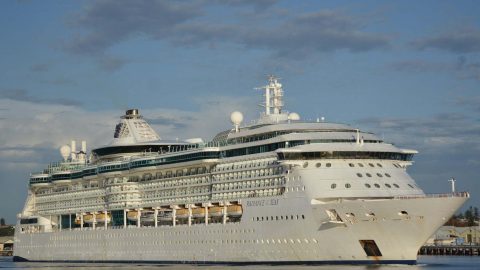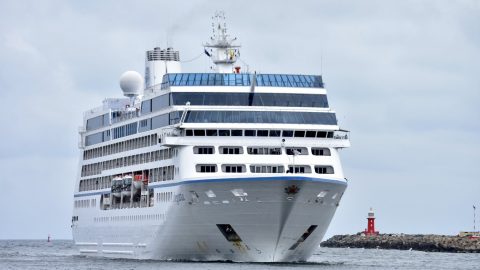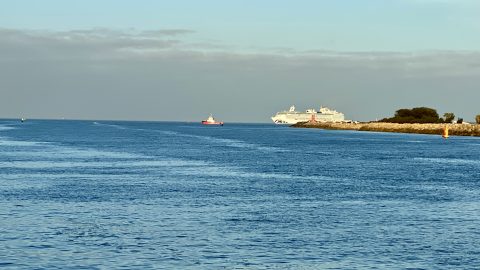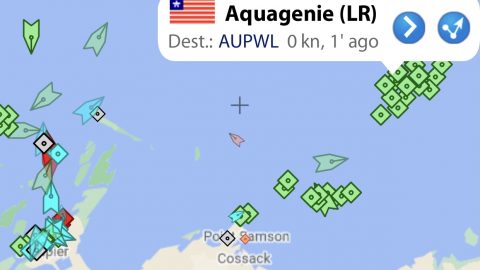Yesterday captured the cruise industry’s full range of reality/unreality.

Seabourn Encore sailed into a secluded bay on the tiny Thai island of Koh Kut where a herculean staff and crew effort hosted a day ashore with a huge supply of food and beverages, plus water sport equipment to supplement leisurely swimming in pristine waters normally seen only in travel brochures. For several hours about five hundred people from around the world enjoyed this idyllic experience before returning to the ship where the normal high standards of service ensured they were looked after and entertained before travelling overnight to Bangkok’s port of Laem Chabang.
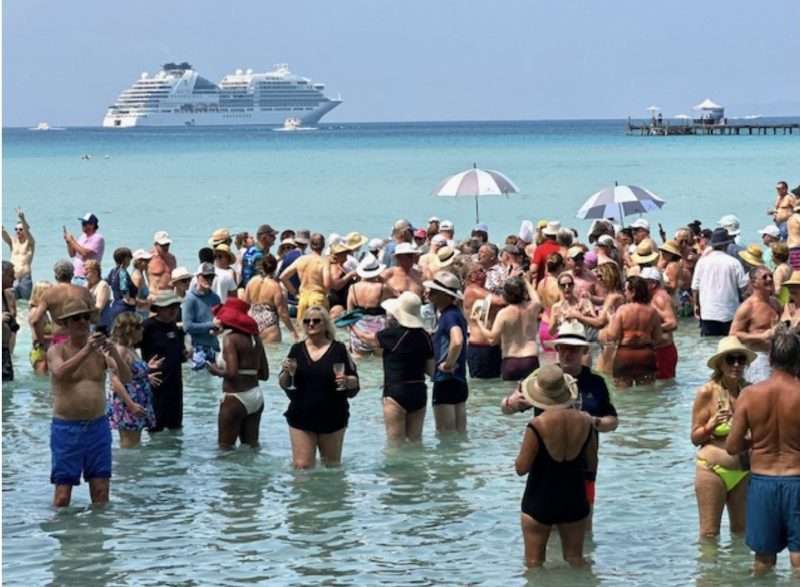
But news arriving also overnight had the outside world intrude bluntly into this perfect illusion. A few industry websites announced Seabourn was matching actions taken by other cruise lines and cancelling imminent sailings through the Suez Canal given recent Red Sea hostilities emanating from the Gaza and Yemen crises.
Encore is directly involved.
Around October every year, the ship repositions (as it is known in the trade) from a Mediterranean base to one centred on Singapore. From then until March it runs two-week sectors around and through Southeast Asa: Singapore to Hong Kong and vice versa, interspersed with Singapore back to Singapore via Thailand, Cambodia, Vietnam and Malaysia voyages.
It is on two of those The Conversationalist is now speaking to a range of topics: the South China Sea, the Straits Chinese, the making of The King and I, the impact of Honda’s small motorbike on Southeast Asian development, the rise of India as a regional and global power, Singapore in the new world order, and others.
Given global events, the role and place of China in this part of the world and more broadly is a hot conversation theme, both around the ship generally and at the dinner tables we “host” a couple of times a week. There is a mix of guests from the United Kingdom, the United States and Australia with European and Asian countries also represented.
Many encounter this region up close for the first time, sometimes with a jolt. Cambodia’s port of Sihanoukville provided one for many people, prompting many questions about how the country ended up with the dreadful Khmer Rouge regime that produced such a collective and still persistent trauma. Those questions also go to how the Belt and Road program saw Cambodia become such an important site for China within ASEAN (the Association of Southeast Asian Nations), leading to massive and largely uncompleted development projects in places like Sihanoukville.

For anyone new to all this, a simple market visit can become confronting but, hopefully, also enlightening. Because here is a chance to see everyday Southeast Asia where people go about their tasks, making a living and looking after families, creating communities and progress, and tolerating governments that have caused all they see around them. In Sihanoukville’s case that includes tourism and casino initiatives yet to be finalised and yet to produce tangible benefits for most inhabitants.
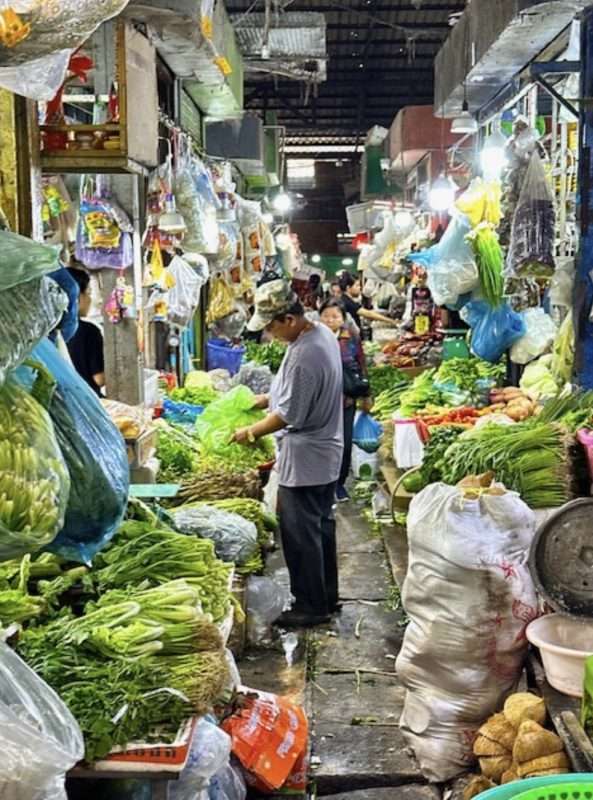
Places like Ho Chi Minh City and Singapore provide other responses, of course, and longer stays in some produce more in-depth visits and experiences that allow greater cross-cultural insights to emerge.
For a few months, then, Encore carries thousands of guests through the region, exposing them to all this and more.
Normally, in late March, the ship then repositions back to its Mediterranean base for the northern hemisphere summer, transiting through the Suez Canal via the Bay of Bengal, the Indian Ocean and the Arabian Sea in one of the best of all voyages: Singapore to Colombo and Bombay, into Dubai than back out of the Gulf via Muscat, Egypt, Jordan, Israel, through the islands to Piraeus and Athens.

This year, however, the overnight news suggests Encore will complete a Hong Kong to Singapore voyage, then miss the two normal Singapore-Dubai, Dubai-Piraeus sectors. Instead, it seems, the ship will sail without guests from Singapore back to the Mediterranean (Barcelona, probably) via the Cape of Good Hope and West then North Africa.
For the cruise line, that massive decision traverses the entire business model of income, costs and profit margins.
Obviously, the decision also impacts guest bookings heavily, so cruise community web pages are already full of questions and pleas for information about cruise credits versus refunds, alternative travels and much more. This is even bigger than might be anticipated, too, because the COVID rebound has seen forward bookings on cruise ships become heavy to the point of saturation. Many voyages are fully booked well in advance of sailing dates. Bookings on Seabourn and other lines are already pushing into 2026.
This disruption, which also involves other Seabourn ships with similar itineraries, extends to booked entertainment and enrichment personnel. These commitments are made well in advance, and for many performers constitute a significant part of a livelihood – one on Encore recently reminded guests that people like him had no income whatsoever during COVID apart from government supports programs. Recovery from that has now been interrupted at least in part by geopolitics.
But spare a big thought for cruise line staff and crew caught up in this upheaval. Seabourn draw people from a multitude of countries. Since the 1970s they have been recruited primarily from Indonesia and the Philippines, but these days that extends to South America (notably Peru), central and eastern Europe, and Africa (with Kenya, South Africa and Zimbabwe prominent). These workers all take contracts for periods of three through nine or more months. For many, the two big sectors now cancelled might well be a full contract period, a significant economic consideration for them and their families. Resolution of this ongoing complication will be a big issue for them, too, given that they are recovering from the COVID hit like everyone else.
While there are many times when a “cruise” seems like an escape from the pressures of normal life, then, moments like this remind us that the industry can never escape the broader context of global political and economic swings.
* Words and photographs by Brian Stoddart. You’ll find more feature articles by Brian Stoddart right here!
While you’re here –
PLEASE HELP US TO GROW FREMANTLE SHIPPING NEWS
FSN is a reader-supported, volunteer-assisted online magazine all about Fremantle. Thanks for helping to keep FSN keeping on!
** Don’t forget to SUBSCRIBE to receive your free copy of The Weekly Edition of the Shipping News each Friday!
